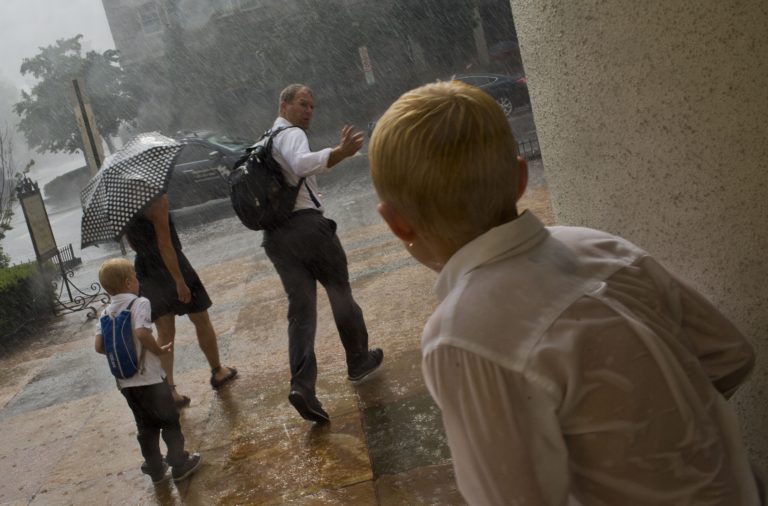
Image by Diego Sevilla Ruiz/Flickr (CC BY-NC-ND 2.0)..
The Fluidity Between Who You Love and What You Love
There are a variety of ugly little phrases that pundits use to evaluate mothers’ choices about work: “opt out,” “mommy track,” “lean in.” Even worse, I’ve heard so many mothers themselves use these reductive phrases like whips to self-flagellate.
We obsessively talk about work/life balance as if it were a problem best solved in 82.5 million different ways (the number of mothers in the U.S.). In this mindset, we ignore the absence of federal policies that could acknowledge and support the vital work of caregiving. We ignore the failures of workplaces to structurally and culturally evolve. Instead, we blame ourselves for not “having it all.” There’s so much language at our disposal as we make this into a personal weakness rather than a societal failure.
There’s a different story I see playing out under the radar. This story doesn’t have as much language to it, because it’s subtle and courageous and about the fluidity between who you love and what you love. It’s not measured within the GDP, and it doesn’t even show up very clearly in the way that the U.S. government measures the kinds and amounts of work that people do.

It’s new parents, often mothers, but fathers too, leaving jobs, not because they can’t “hack it” but because their vision on what they value and what their gifts are, and how they want to spend their time in relation to this understanding, is sharpened. Giving birth and learning to mother (or father) is inherently destabilizing in a way that forces you to ask yourself: Who am I? What is my value? What lights me up and what deadens my spirit? The answers aren’t just about parenthood, but about personhood. It’s humbling and exalting all at once.
Your time is suddenly deeply constrained, of course, but as opposed to being exclusively a burden, this — it turns out — is also a gift. You don’t have time to tolerate unproductive drama. You don’t have the capacity to put up with collaborators that don’t have a sense of humor about themselves or the world’s many cosmic jokes. In your limited time, with your limited energy, you are driven to surround yourself with brilliant, kind, humble people who you can be real and brave with. You want to make meaningful things together. And have fun doing it.
Money is newly important, from a certain angle, and newly devalued, from another. You want to be able to keep your kid healthy and happy, and in so far as money can buy those things, you want some. But you also understand that money for money’s sake is bullshit. (When you leave the hospital, you go home with one of those cute little striped hats, and the most ferocious bullshit detector imaginable.)
Suddenly working hard at something you don’t care about, or have grown bored with, doesn’t have as much pull just because it comes with a big, impressive paycheck. You’d rather dress your kid in hand-me-downs and be with her on Fridays than have the flossiest baby on the block whose bedtime you consistently miss while stuck in traffic.

The other thing that rarely gets acknowledged is that becoming a parent is like a creativity enhancement drug. You rediscover the challenge and mellifluousness of the guitar, the meditative joy of coloring, the intricate dance of the human mind as it’s developing. Watching my daughter’s brain put things together into categories — balls and bubbles and polka dots and the moon — is enough to send me down a wormhole of wonder about the natural world. That was all but dead to me before I met Maya.
I’ve lifted my hands off the keyboard and remembered what they are for: finding the ripe strawberries amid the leaves and the dirt, wiping tears from frustrated eyes, feeling the cool relief of water pouring from the hose (okay, maybe more like trickling…we live in California). That has far less to do with my ego than with my sensory experience of the world. Having a toddler has yanked me into the present like no meditation course I’ve ever taken, and I’ve taken a lot of them with very talented teachers (Sharon, ahem).
So yes, having a kid forces you to make all kinds of damned-if-you-do-damned-if-you-don’t choices, particularly if you don’t have the kind of privilege — class and otherwise — that I and so many others enjoy. But it also clarifies your dream for your life. It makes you drunk with love and wonder and sober about time and money. It gets you present. It shrinks your ego and enlarges your spirit. None of that, not one little bit, feels represented in the larger story we tell about the struggles of the working parent.
There is a lot of sacrifice, to be sure. There’s plenty of failure — both personal and collective, too. But there is also an incalculable urgency and delight.

